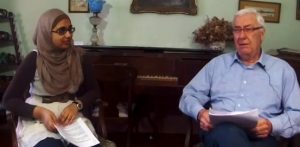The MHSO believes that activities in which participants create and engage with primary sources provide entry points into the past. It is also convinced that asking questions of, and forming ideas about, such sources helps individuals and groups to learn that history is a dynamic process of developing knowledge as well as an act of interpretation. The Society has, consequently, devoted significant time to assisting students and community organizations in oral history and public history projects. It has provided training, guidance, and resources, with remarkable results.
Internship in History and New Land, New Life
During the 2012/13 academic year, two 4th year undergraduate students in the Internships in History Program at the University of Toronto Mississauga served their placements at the MHSO. One of the students, Fatima Altaf, had an interest in the experiences of Pakistani immigrants in Canada, as well as skills in filmmaking. For her internship, she produced a documentary film entitled New Land, New Life.  The film explores the lives of immigrant women of Pakistani descent before and after moving to Canada, focusing on their experiences, expectations, and perceptions. The MHSO provided Fatima with training in oral history and video interviewing, guidance in developing the questions and themes for her project, and the recording devices necessary for the interviews. After speaking with four Pakistani women living in Ontario, Fatima not only produced a documentary that powerfully drew out the similarities and differences in their immigration experiences, but she also transcribed the interviews and donated them to the MHSO Archives. The interviews make an important contribution to the Society’s oral history collection since they augment a small number of video interviews in an extensive assemblage of audio recordings. The interviews provide illuminating insights into Canadian multiculturalism, immigrant experiences, and identity negotiation.
The film explores the lives of immigrant women of Pakistani descent before and after moving to Canada, focusing on their experiences, expectations, and perceptions. The MHSO provided Fatima with training in oral history and video interviewing, guidance in developing the questions and themes for her project, and the recording devices necessary for the interviews. After speaking with four Pakistani women living in Ontario, Fatima not only produced a documentary that powerfully drew out the similarities and differences in their immigration experiences, but she also transcribed the interviews and donated them to the MHSO Archives. The interviews make an important contribution to the Society’s oral history collection since they augment a small number of video interviews in an extensive assemblage of audio recordings. The interviews provide illuminating insights into Canadian multiculturalism, immigrant experiences, and identity negotiation.
Orde Street Junior Public School Oral History Project
School memories can provide interesting insights into Canadian multiculturalism and the lives of immigrant families. In the spring of 2015, the MHSO worked with Orde Street Junior Public School to produce a collection of fourteen oral history interviews. The interviews, which contain memories of former students, teachers, and principals from the 1920s into the 2000s, were conducted by Grade 5 and 6 students with the assistance of teachers, Diana D’Oria and Martin Lewis, and parent and historian, Anne Keary. After participating in the MHSO’s Collecting Voices workshop, the teachers relayed the knowledge and skills they had acquired to their students, and helped them develop questions to learn about their school’s past. The students then conducted a series of interviews, asking questions such as ‘What was the cultural makeup of the students at the school?’ and ‘Where did most of the students from Orde live?’ Through this experience, the students not only learned more about the history of their school, but they also recognized that they were part of that history. Some of their reflections on the process are recorded below. Sections of the interviews conducted at Orde were made into a video which was played at the school’s Centenary Celebrations on September 26, 2015. The interviews were also used by Anne Keary in documenting the school’s history in her blog, Orde Street School: 100 Years of History.
Student Reflections
Aishoo Nandakumar
Working on the interviews and seeing a glimpse of Orde’s past was amazing. I have to admit, it was hard work since we – kids – were the interviewers but, in the end, it paid off. It’s not every day you get to interview a woman who turned 100 on the same year that the school celebrated its 100th. I mean, how cool is it to hear and visualize what  your school was like back then! I might have had my doubts about being a part of the interviews then but now I know I couldn’t have made a better decision.
your school was like back then! I might have had my doubts about being a part of the interviews then but now I know I couldn’t have made a better decision.
Benjamin Keary-Matzner
My experience of being an interviewer was fun but stressful at the same time. When I was interviewing, it was very hard to come up with the right questions to ask in response to what they were saying. It was fun when I listened to the interviewees’ answers.
Emily Tieu
I was a little nervous at first because, I guess I was nervous, but it was really fun preparing for it. I enjoyed it a lot! It’s funny how you can be a little scared during the interview but excited at the same time. I’m so happy that I got to be a part of something so special like this at Orde St. P.S.
Andrew Song
I thought conducting the interviews was very fun. I was relieved to hear that I wasn’t going to be filmed too. I was very nervous when I was interviewing and felt like I was going to fail but I did alright.
Kensington Market Historical Society Oral History Project
A diverse neighbourhood in downtown Toronto, Kensington Market exemplifies, in one vibrant site, the variety of immigrant experiences in Ontario. In the fall of 2013, the Kensington Market Historical Society (KMHS) began an oral history project to record and make accessible the personal narratives of past and present neighbourhood residents. The MHSO played an important role in this project, providing training in conducting oral history interviews and helping with the transcription process. To date, sixteen interviews have been undertaken by the lead project coordinator, Bruce Beaton. The interviews include stories related to the Jewish, Jamaican, Portuguese, Chinese, and  Hungarian communities, thus illuminating the diversity of Kensington Market. They also provide important insights into family experiences during the Second World War, the relationship between food and culture, geographical changes in the neighbourhood, and the culture of hard work in the market. The KMHS oral history project interviews are currently showcased in General Eclectic: Oral Histories from Kensington Market, a digital exhibition that features interview excerpts. The website was produced by Marianne Williams and Rachel Leaton in partnership with KMHS through the Master of Museum Studies Program at the University of Toronto.
Hungarian communities, thus illuminating the diversity of Kensington Market. They also provide important insights into family experiences during the Second World War, the relationship between food and culture, geographical changes in the neighbourhood, and the culture of hard work in the market. The KMHS oral history project interviews are currently showcased in General Eclectic: Oral Histories from Kensington Market, a digital exhibition that features interview excerpts. The website was produced by Marianne Williams and Rachel Leaton in partnership with KMHS through the Master of Museum Studies Program at the University of Toronto.
Aurora Historical Society Oral History Project
In 2014 and 2015, the Aurora Historical Society (AHS) undertook an oral history project. Its objective was to preserve the intangible aspects of Aurora’s heritage through the production of an online library of personal narratives. The oral history interviews were conducted by a group of volunteer high school students and AHS’s Curator, Erika Mazanik. After receiving training through the MHSO’s Collecting Voices workshop, the interviewers engaged with seniors in their community, producing a total of thirteen video interviews. The interviews provide important insights into the changing geography of Aurora, the education system – a number of narrators were  former teachers – and life in the town during the Second World War. Given the greater immediacy of personal narratives, the interviews add a human dimension to accounts of Aurora’s past that is often absent from traditional historical sources. Conducting the oral history interviews also helped to build community between youth and seniors in Aurora. The project culminated in the Let’s Talk Aurora website, which features the video interviews, transcriptions of the interviews produced by high school students, and some information about the seniors involved. The project received support from the New Horizons for Seniors Program, the Senior Wish Association, and the Hollandview Trail Retirement Residence.
former teachers – and life in the town during the Second World War. Given the greater immediacy of personal narratives, the interviews add a human dimension to accounts of Aurora’s past that is often absent from traditional historical sources. Conducting the oral history interviews also helped to build community between youth and seniors in Aurora. The project culminated in the Let’s Talk Aurora website, which features the video interviews, transcriptions of the interviews produced by high school students, and some information about the seniors involved. The project received support from the New Horizons for Seniors Program, the Senior Wish Association, and the Hollandview Trail Retirement Residence.
Hacking History and the Oral History Museum
 The MHSO’s Oral History Museum, which contains oral history interviews, videos, images, music, and educational materials, is a valuable resource for learning about our histories of migration and ethnicity. In the spring of 2014, four students in ‘Hacking History’, a 4th year undergraduate course offered in the History Department at the University of Toronto, converted the museum into an online resource. After spending a semester with Professor Matt Price acquiring the theoretical and technical knowledge needed to build an historical website, students Río Rodríguez, Guillaume Kishibe, Marc Dodsworth, and Melissa Cederqvist collaborated with the MHSO to move the Oral History Museum online. The students focused on making the website navigable, interactive, and visually appealing. The project gave the students an opportunity to apply their web-development skills within a community historical organization, allowing them to experience both the challenges and the rewards associated with digital and public history. The MHSO also benefited from the hard work and digital media skills of the students. Previously, the Oral History Museum was accessible only on-site at the Society’s office. With its conversion into an online resource, the MHSO is now able to make the many materials and resources within the museum more broadly accessible.
The MHSO’s Oral History Museum, which contains oral history interviews, videos, images, music, and educational materials, is a valuable resource for learning about our histories of migration and ethnicity. In the spring of 2014, four students in ‘Hacking History’, a 4th year undergraduate course offered in the History Department at the University of Toronto, converted the museum into an online resource. After spending a semester with Professor Matt Price acquiring the theoretical and technical knowledge needed to build an historical website, students Río Rodríguez, Guillaume Kishibe, Marc Dodsworth, and Melissa Cederqvist collaborated with the MHSO to move the Oral History Museum online. The students focused on making the website navigable, interactive, and visually appealing. The project gave the students an opportunity to apply their web-development skills within a community historical organization, allowing them to experience both the challenges and the rewards associated with digital and public history. The MHSO also benefited from the hard work and digital media skills of the students. Previously, the Oral History Museum was accessible only on-site at the Society’s office. With its conversion into an online resource, the MHSO is now able to make the many materials and resources within the museum more broadly accessible.

